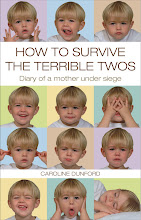Wednesday, 27 October 2010
Burke
Tuesday, 13 July 2010
Poor neglected blog
Tuesday, 1 June 2010
Writing Plays
Wednesday, 3 March 2010
Euphemia in Mensa
Caroline Dunford
October 2009 saw the release of my first crime novel, A Death in the Family: A Euphemia Martins Mystery. Previously I’d been most well known for a book I published documenting the second year in the life of my toddler (now 8). So what causes a mother writing about her challenging child to turn to crime?
It’s a good and a difficult question. It’s right up there with the perennial favourite of readers ‘how do you get your ideas?’ All writers hate that question not because they think it’s a foolish one, but if we’re honest, because we rarely know.
I can say that the traumas, heightened emotions and constant tension required of a murder mystery aren’t that different to being the main carer of a toddler (and last February I made myself another one.) But it’s really more about how I approached both topics that gives me my signature style. If some murder mysteries are best drunk with a glass of whisky by your side to fortify you against the more visceral moments, my murder mystery is best read in a comfy chair with a cup of tea and a nice biscuit. I hope on occasion my readers will be nibbling their nails nervously, but I also expect them to snort tea down their nose from laughing so hard.
It’s taken me a very long time to discover my writing style. The somewhat quirky take on life that I initially developed as a personal survival device against a constantly bemusing world turns out to be also the best way for me to tell stories. Euphemia is set in 1910 and behind the laughter and the headstrong (often naïve) antics of the eighteen year old heroine the books confront the very real differences of class, gender and the incoming storm-clouds of WW1.
The story of how Euphemia came into being is even less straight forward. I heard from a fellow writer that ePrint Publishing, previously an educational materials only publisher, was looking for writers of thrillers and mysteries for their new Read Away imprint. My sense of the market told me this was not an opportunity to be missed. I contacted them at once and asked if I could submit. I was politely told they were seeking prospective work from among their already large stable of authors. I pleaded that one had referred me and was allowed to send a chapter and synopsis, but it would need to be delivered in a matter of weeks.
I went to bed wracking my brains trying to think how I could make a science-fiction thriller appeal to a wide audience and woke up with the idea of the Euphemia Martins Mysteries – which are light historical crime stories with a nod to Agatha Christie and Jane Austen in style. My subconscious clearly has a better insight into the literary market than my waking mind.
Euphemia Martins might have been created literally over night, but she had an extremely long gestation period. She is partly inspired by my great grandmother, who came from a very wealthy family, but on falling out with her new-step mother, ran away from home and into service. And so a family legend was born.
Although I never met her as a child I loved her story. It sounded so romantic. As an adult I realized her life was more likely to have been hard and difficult, but I admired her enormously for her independent spirit in a time when women were of very little account.
My switch to crime becomes even easier to understand when you know that like most Mensans I love puzzles and I love crime novels. I’d never written one because I don’t know (or particularly want to know) a lot about either forensics or police procedure. However, in 1910 forensics were very limited and by making my investigation team a maid and the younger son of rich, but disreputable family, I’ve almost entirely side-stepped the police. My background in psychotherapy helps me create three dimensional characters and also gives me a good grounding in what will drive a person to murder.
I heard Euphemia’s voice from the first sentence of chapter one and I knew I had something special. Fortunately ePrint agreed and before book one was even completed we were talking about the series. My crime writing is now an established part of my life and the family know the tell-tale signs of when I am disappearing back into 1910. Books two and three (‘A Death in the Highlands’ and ‘A Death in the Asylum’) are scheduled for release this year and book one has just been entered into the Orange Prize.
A Death in the Family: A Euphemia Martins Mystery (ePrint Publishing) is available now in paperback (£6.99) from the publisher’s website http://www.readaway.co.uk/, http://www.amazon.co.uk/ and from all good bookstores.
How to Survive the Terrible Twos: Diary of a mother under siege (£7.99) available direct from http://www.crimsonpublishing.co.uk/, http://www.amazon.co.uk/ and from all good bookstores,






